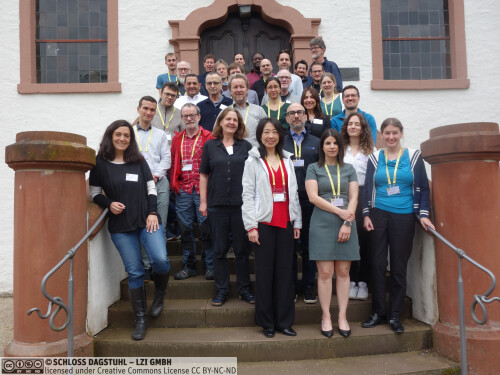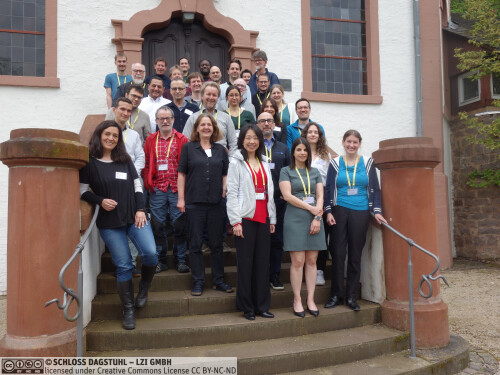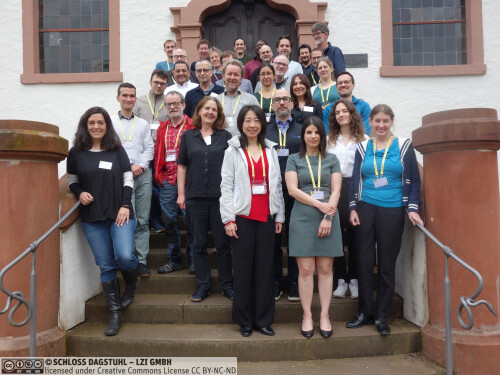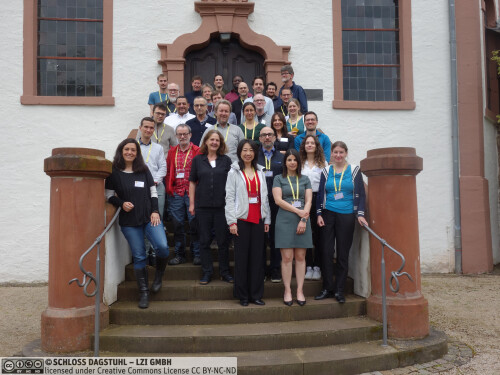Dagstuhl Seminar 24192
Generalization by People and Machines
( May 05 – May 08, 2024 )
Permalink
Organizers
- Barbara Hammer (Universität Bielefeld, DE)
- Filip Ilievski (VU Amsterdam, NL)
- Sascha Saralajew (NEC Laboratories Europe - Heidelberg, DE)
- Frank van Harmelen (VU Amsterdam, NL)
Contact
- Andreas Dolzmann (for scientific matters)
- Susanne Bach-Bernhard (for administrative matters)
Impacts
- Aligning Generalisation Between Humans and Machines - Ilievski, Filip; Villmann, Thomas; Ven, Gido van de; Shawe-Taylor, John; Serafini, Luciano; Pasi, Gabriella; Oltramari, Alessandro; Ngonga Ngomo, Axel-Cyrille; Mundt, Martin; Hitzler, Pascal; Dong, Xin Luna; Biehl, Michael; Schmid, Ute; Saralajew, Sascha; Harmelen, Frank van; Hammer, Barbara; Ilievski, Filip; Minervini, Pasquale; Saribatur, Zeynep G.; Shwartz, Vered; Skitalinskaya, Gabriella; Paassen, Benjamin; Bolognesi, Marianne; Gashteovski, Kiril; Marra, Giuseppe; Stachl, Clemens - Cornell University : arXiv.org, 2024. - 35 pp..
- Aligning generalization between humans and machines - Ilievski, Filip; Villmann, Thomas; Ven, Gido van de; Shawe-Taylor, John; Serafini, Luciano; Pasi, Gabriella; Oltramari, Alessandro; Ngonga Ngomo, Axel-Cyrille; Mundt, Martin; Hitzler, Pascal; Dong, Xin Luna; Biehl, Michael; Schmid, Ute; Saralajew, Sascha; Harmelen, Frank van; Hammer, Barbara; Ilievski, Filip; Minervini, Pasquale; Saribatur, Zeynep G.; Shwartz, Vered; Skitalinskaya, Gabriella; Paassen, Benjamin; Bolognesi, Marianne; Gashteovski, Kiril; Marra, Giuseppe; Stachl, Clemens - London : Nature Publishing Group, 2025 - (Nature machine intelligence ; 2025).
Schedule
- Humans and Machines Learn Differently - Kristina Nienhaus in Universität Bielefeld News, September 15, 2025. Also published in TechXplore. A Spanish version by Aurora Castro was published in Revista La Velez.
- Dagstuhl: A shining light in the Hochwald Black Forest - Alessandro Oltramari in CarnegieBosch Institute News, July 9, 2024
The Dagstuhl Seminar consisted of
- lightning talks, where each participant had 2min for a short introduction and the presentation of a motivating (funny) example of generalization,
- perspective pitches, where invited researchers from different domains gave a short talk about generalization in their domain (15min talk and 15min discussion),
- daily discussion breakout sessions, where researchers organized in groups to discuss aspects of generalization and to work on the joint perspectives paper, and
- plenary sessions, where we discussed the progress and results of the different breakout groups and organizing question around the seminar.
Day 1 featured an introductory session by the organizers and the lightning talks. During day 1, there were two perspective pitches on generalization from the angle of analogy (by Ken Forbus) and knowledge representation in symbolic AI (by Luciano Serafini). In the afternoon of day 1, the participants discussed generalization in four working groups:
- types of generalization,
- methods of generalization,
- evaluation of generalization, and
- human-AI teaming.
All teams were comprised of participants with diverse background and interests. The formation of these four groups was informed by a poll on possible topics that was sent to the participants before the seminar, filled by nearly all participants. At the end of day 1, each group provided updates centered around three questions:
- How is it done today?
- How well are we doing?
- What are open challenges and important future directions?
Day 1 ended up with a plenary session during which each of the groups reported on their initial ideas, and received feedback from the other participants.
Day 2 featured four perspective pitches, highlighting the angles of statistical physics (by Michael Biehl), cognitive science (by Ute Schmid), computational linguistics (by Vered Shwartz), and computer vision (by Wael AbdAlmageed). In the afternoon, the participants split into the same four working groups as in day 1, with an instruction to organize the list of considerations from day 1. A key goal was to narrow down the scope of each working group and to identify important points to focus on. Day 2 ended with a debrief by the breakout sessions, during which common aspects emerged in different groups.
To facilitate a fruitful end of the seminar, the organizers came up with a set of 4 pillars that each of the groups was supposed to organize their content around, during day 3. These included: theory, context, representation, and foundational models. On day 3, each group provided an attempt to organize their content into these four pillars to the extent possible. Day 3 (half a day) ended with a discussion on the next steps, with a specific goal of writing a joint agenda-setting paper with all participants, targeted at a prestigious venue.
In the meantime, the organizers and Prof.~Ute Schmid formed an editorial team that has been leading the process of writing the perspectives paper, and the participants provided two versions of write-up from their group: a long version and a short version. The short versions are limited to 2-3 pages and 20-25 citations, to conform jointly with the restrictions of journals like Nature Machine Intelligence. At the time of writing, the editorial team is busy with preparing this submission, with another round of feedback and collaboration scheduled with the participants in August.
 Filip Ilievski and Sascha Saralajew
Filip Ilievski and Sascha Saralajew
Today's AI systems are powerful to the extent that they have largely entered the mainstream and divided the world between those who believe AI will solve all our problems and those who fear that AI will be destructive for humanity. Meanwhile, trusting AI is very difficult given its lack of robustness to novel situations, consistency of its outputs, and interpretability of its reasoning process. Adversarial studies have demonstrated that current AI approaches for tasks like visual object detection and text classification are not as robust as hoped. Models struggle with connecting situations via higher-order similarities, performing commonsense reasoning, and their performance is largely correlated with training data frequencies. Together with informative signals, the models also pick on spurious correlations between terms and annotation biases, while being insensitive to subtle variations like negation. These findings inspired an arms race between the robustifaction of models and breaking their robustness. Building trustworthy AI requires a paradigm shift from the current oversimplified practice of crafting accuracy-driven models to a human-centric design that can enhance human ability on manageable tasks, or enable humans and AIs to solve complex tasks together that are difficult for either separately.
At the core of this problem is the unrivaled human generalization and abstraction ability. While today's AI is able to provide a response to any input, its ability to transfer knowledge to novel situations is still limited by oversimplification practices, as manifested by tasks that involve pragmatics, agent goals, and understanding of narrative structures. It is clear that some generalization is enabled by scaling up data or model complexity, but this idea is hitting a limit, surfacing the idea that something is missing. Recent work has addressed this gap to some extent by proposing modular architectures that involve generating rationales, tracking participant states in narratives, modeling user intent, and including planning objectives in language modeling. Meanwhile, cognitive mechanisms that drive generalization in people, like reasoning by analogy and deriving prototypes are popular in cognitive science research but have not gained mainstream adoption in machine learning techniques. As there are currently no venues that allow cross-disciplinary research on the topic of reliable AI generalization, this discrepancy is problematic and requires dedicated efforts to bring in one place generalization experts from different fields within AI, but also with Cognitive Science.
This Dagstuhl Seminar provides a unique opportunity for discussing the discrepancy between human and AI generalization mechanisms and crafting a vision on how to align the two streams in a compelling and promising way that combines the strengths of both. To ensure an effective seminar, we aim to bring together cross-disciplinary perspectives across computer and cognitive science fields. Our participants will include experts in Interpretable Machine Learning, Neuro-Symbolic Reasoning, Explainable AI, Commonsense Reasoning, Case-based Reasoning, Analogy, Cognitive Science, and Human-Computer Interaction. Specifically, the seminar will focus on the following questions: How can cognitive mechanisms in people be used to inspire generalization in AI? What Machine Learning methods hold the promise to enable such reasoning mechanisms? What is the role of data and knowledge engineering for AI and human generalization? How can we design and model human-AI teams that can benefit from their complementary generalization capabilities? How can we evaluate generalization in humans and AI in a satisfactory manner?
 Barbara Hammer, Filip Ilievski, Sascha Saralajew, and Frank van Harmelen
Barbara Hammer, Filip Ilievski, Sascha Saralajew, and Frank van Harmelen
- Wael Abd-Almageed (Clemson University, US) [dblp]
- Michael Biehl (University of Groningen, NL) [dblp]
- Marianna Marcella Bolognesi (University of Bologna, IT) [dblp]
- Xin Luna Dong (Meta Reality Labs - Bellevue, US) [dblp]
- Kenneth D. Forbus (Northwestern University - Evanston, US) [dblp]
- Kiril Gashteovski (NEC Laboratories Europe - Heidelberg, DE) [dblp]
- Barbara Hammer (Universität Bielefeld, DE) [dblp]
- Pascal Hitzler (Kansas State University - Manhattan, US) [dblp]
- Filip Ilievski (VU Amsterdam, NL) [dblp]
- Giuseppe Marra (KU Leuven, BE) [dblp]
- Pasquale Minervini (University of Edinburgh, GB) [dblp]
- Martin Mundt (TU Darmstadt, DE) [dblp]
- Axel-Cyrille Ngonga Ngomo (Universität Paderborn, DE) [dblp]
- Alessandro Oltramari (Carnegie Bosch Institute - Pittsburgh, US) [dblp]
- Benjamin Paaßen (Universität Bielefeld, DE)
- Gabriella Pasi (University of Milan, IT) [dblp]
- Sascha Saralajew (NEC Laboratories Europe - Heidelberg, DE) [dblp]
- Zeynep G. Saribatur (TU Wien, AT) [dblp]
- Ute Schmid (Universität Bamberg, DE) [dblp]
- Luciano Serafini (Bruno Kessler Foundation - Trento, IT) [dblp]
- Dafna Shahaf (The Hebrew University of Jerusalem, IL) [dblp]
- John Shawe-Taylor (University College London, GB) [dblp]
- Vered Shwartz (University of British Columbia - Vancouver, CA) [dblp]
- Gabriella Skitalinska (Leibniz Universität Hannover, DE)
- Clemens Stachl (Universität St. Gallen, CH) [dblp]
- Gido van de Ven (KU Leuven, BE) [dblp]
- Frank van Harmelen (VU Amsterdam, NL) [dblp]
- Thomas Villmann (Hochschule Mittweida, DE) [dblp]
- Piek Vossen (VU Amsterdam, NL) [dblp]
- Michael R. Waldmann (Universität Göttingen, DE) [dblp]
Classification
- Artificial Intelligence
- Machine Learning
- Symbolic Computation
Keywords
- Interpretable Machine Learning
- Human-AI Collaboration
- Cognitive Science
- Neuro-Symbolic Reasoning
- Explainability





 Creative Commons BY 4.0
Creative Commons BY 4.0
